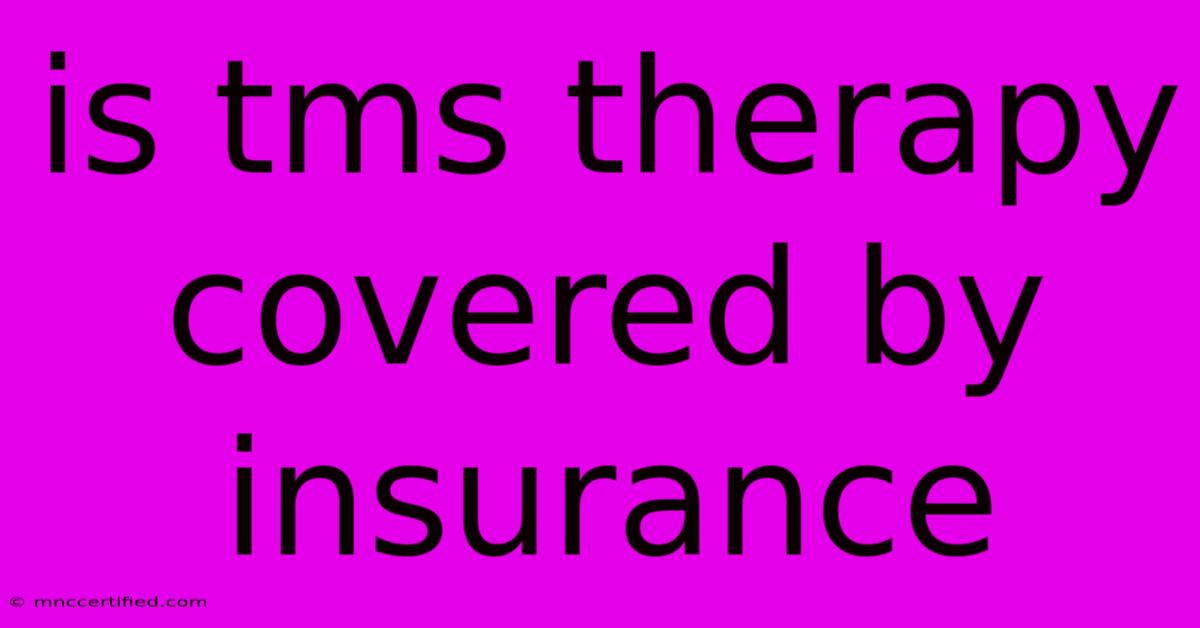Is Tms Therapy Covered By Insurance

Table of Contents
Is TMS Therapy Covered by Insurance? A Comprehensive Guide
Transcranial magnetic stimulation (TMS) therapy is a non-invasive treatment that uses magnetic pulses to stimulate specific areas of the brain. It has shown promising results in treating conditions like depression, anxiety, and obsessive-compulsive disorder (OCD). However, a common question that arises for many potential patients is: Is TMS therapy covered by insurance?
The answer is not straightforward and depends on various factors, including your specific insurance plan, your diagnosis, and your location.
Factors Affecting Insurance Coverage for TMS Therapy
1. Insurance Plan:
- Type of plan: Your insurance coverage is determined by your specific plan. Some plans offer comprehensive coverage for mental health treatments, including TMS therapy. Others might have limited coverage or require pre-authorization.
- Network: Make sure the TMS provider is within your insurance network. Out-of-network providers may not be covered or may result in higher out-of-pocket expenses.
2. Diagnosis:
- Specific condition: Coverage for TMS therapy is often tied to the specific condition being treated. It's generally covered for major depressive disorder that hasn't responded to traditional medications. Coverage for other conditions like anxiety or OCD may be more limited.
- Treatment history: Some insurance plans require a documented history of failed treatments (e.g., medication or therapy) before approving TMS therapy.
3. Location:
- State laws: State regulations vary regarding mental health coverage. Some states have mandated coverage for TMS therapy for specific conditions.
- Provider availability: The availability of TMS therapy providers in your area also plays a role. The more providers in your region, the more likely insurance companies are to offer coverage.
How to Determine Coverage
-
Contact your insurance provider: The best way to determine your coverage is to directly contact your insurance company. Ask specifically about coverage for TMS therapy, including:
- Pre-authorization requirements
- Co-pays and deductibles
- Network providers
- Coverage limitations
-
Check your benefits booklet: Your insurance benefits booklet contains information about covered treatments and limitations.
-
Ask your doctor: Your doctor can guide you through the process and help you navigate insurance requirements.
Options for Uncovered or Limited Coverage
Even if your insurance doesn't fully cover TMS therapy, several options exist:
- Appeal: You can appeal your insurance company's decision if you believe TMS therapy is medically necessary for your condition.
- Payment plans: Some TMS providers offer payment plans or financing options.
- Health savings accounts (HSAs) and flexible spending accounts (FSAs): You can use tax-advantaged accounts to pay for out-of-pocket expenses.
Conclusion
While insurance coverage for TMS therapy can be complex, understanding your specific plan and talking to your insurance provider is essential. By taking the necessary steps, you can increase your chances of receiving coverage for this potentially life-changing treatment. Remember to explore options for coverage even if your insurance initially denies it.

Thank you for visiting our website wich cover about Is Tms Therapy Covered By Insurance. We hope the information provided has been useful to you. Feel free to contact us if you have any questions or need further assistance. See you next time and dont miss to bookmark.
Featured Posts
-
Hotel Room Intruder British Mums Panic
Nov 13, 2024
-
Insurance For Motorcycle In Florida
Nov 13, 2024
-
Black Panther 3 Could Be Denzel Washingtons Last
Nov 13, 2024
-
Bolton Vs Fleetwood Prediction And Team News
Nov 13, 2024
-
Waldron Fired Bears Williams Future Uncertain
Nov 13, 2024